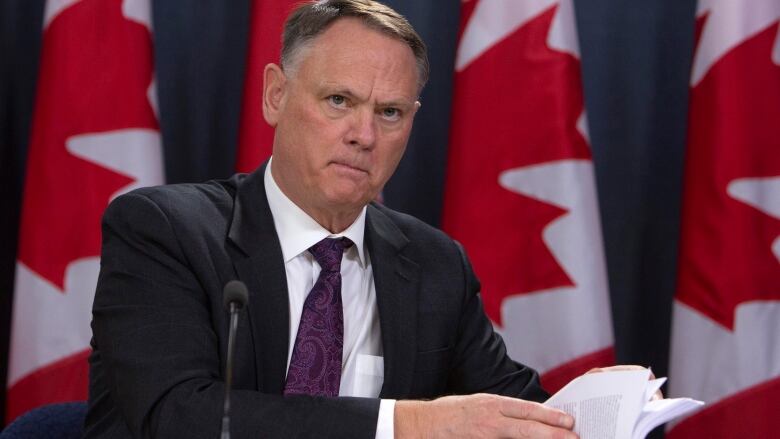We have entered an era in which national security is not just about protecting the state against adversaries, but also against dangers that have a direct impact on the daily lives of people, write Aaron Shull and Wesley Wark.

This column is an opinion by Aaron Shull and Wesley Wark. Shull is managing director and general counsel of the Waterloo, Ont.-based Centre for International Governance Innovation, and Wark is a senior fellow at CIGI. They are co-leads of a project called Reimagining Canadian National Security Strategy for the 21st Century. For more information about CBC’s Opinion section, please see the FAQ.
An invisible virus borne on the air and reaching across continents and oceans, moving freely among people, disrespecting borders and ideas of state sovereignty, will mark the most profound shake-up of thinking about national security since the beginning of the atomic age in 1945.
We have entered an era in which national security is not just about protecting the state against adversaries, but also against dangers that have a direct impact on the daily lives of people.
The vectors of these threats are new and different — they don’t present the menacing face of armies and war, the shadowy artifice of the traditional spy, or the low-tech threat of terrorism. The new threats come at us straight out of our digital environment and are unleashed out of the natural world.
Digitally enabled threats take aim at precious resources — our data, our economy, our research — and the fundamentals of our democracy. They rob us and bend the truth, and as more of our economy is digitally enabled it is capable of being digitally disabled.
Natural hazards from climate change and the globalized spread of serious infectious diseases threaten livelihoods and lives across the country.
Thinking about national security in Canada has long been the preserve of small cadres of federal government officials and even smaller elements of civil society, each profoundly disconnected from the other. It’s not a subject taught much at our colleges and universities, from which future generations of leaders emerge as innocents. National security has rarely penetrated public debate, hardly ever featured in election campaigns, and only spasmodically seized the headlines — usually in moments of scandal.
In the new environment in which we live, that must change.
Government, political parties, and civil society must all pivot to a new understanding of what national security means and how threats are expected to be met.
We have, in Canada, a long way to go to embrace this new and disquieting understanding of national security, yet our collective future depends on it.

The distance we have to go was on display recently in two reports tabled in Parliament.
One was presented by the National Security and Intelligence Committee of Parliamentarians (NSICOP), a cornerstone of the Liberal government’s efforts to create a much stronger system of review for our security agencies. NSICOP devoted the entirety of its 2020 annual report to an analysis of the national security threats facing Canada.
This was a laudable endeavour, but one mired in conventional thinking. It failed to be sufficiently forward looking, and the committee limited itself to a discussion of five threats:
- Terrorism
- Espionage and foreign interference
- Malicious cyber activities
- Major organized crime
- Weapons of mass destruction
All of these are undoubtedly threats, but look hard at this list and you see the conceptual problems.
To give priority of place to terrorism threats is legacy thinking. Espionage and foreign interference are distinct problems, not to be mashed together. Organized crime comes into the national security picture only in very specific manifestations.
More problematic by far is what is missing: pandemic and biosecurity threats, climate change security impacts, and economic security. Precisely the issues that matter most to Canadians, the ones that have the greatest impact on their daily lives, were absent from the frame.

The Canadian Security Intelligence Service (CSIS), in its annual public report for 2020, did better. It is clear from the report that CSIS is seized by threats to Canada’s economic security, including those that emerged to the bio-pharma sector during the early months of COVID-19.
Likewise, troubling state-sponsored disinformation campaigns are now on the CSIS radar. Counterintelligence, long a pillar of CSIS operations, is now focused beyond espionage on foreign interference operations.
The CSIS mandate places it squarely in the fight against violent extremism, but unlike the National Security and Intelligence Committee of Parliamentarians, CSIS does not make this the top item in its picture of the threat environment.
And CSIS is working alongside the Communications Security Establishment in trying to understand and counter cyber threats.
However, the CSIS picture of the threat environment is necessarily geared to its lawful mandate. It doesn’t have a pandemic security mission writ large, or a climate change security mandate.
To embrace those missions properly will require new thinking and new ways of organizing our national security apparatus.
When it comes to national security, the past is not prologue. The present is moving fast and the future is hard to get a grip on. But here is a prediction: the comfortable and time-honoured habit of treating national security as far-removed from the general public discourse, of erasing it from politics, is over.
The 2015 federal election in which the Conservatives stumbled over opposition to their anti-terrorism legislation was but a small foreshadowing of a much larger debate over how to live safely, prosperously and democratically in a new age.
The next federal election campaign will be one in which all parties will have to prepare coherent and plausible visions of national security, and argue them in public in the interests of all Canadians.
- This column is part of CBC’s Opinion section. For more information about this section, please read our FAQ.
